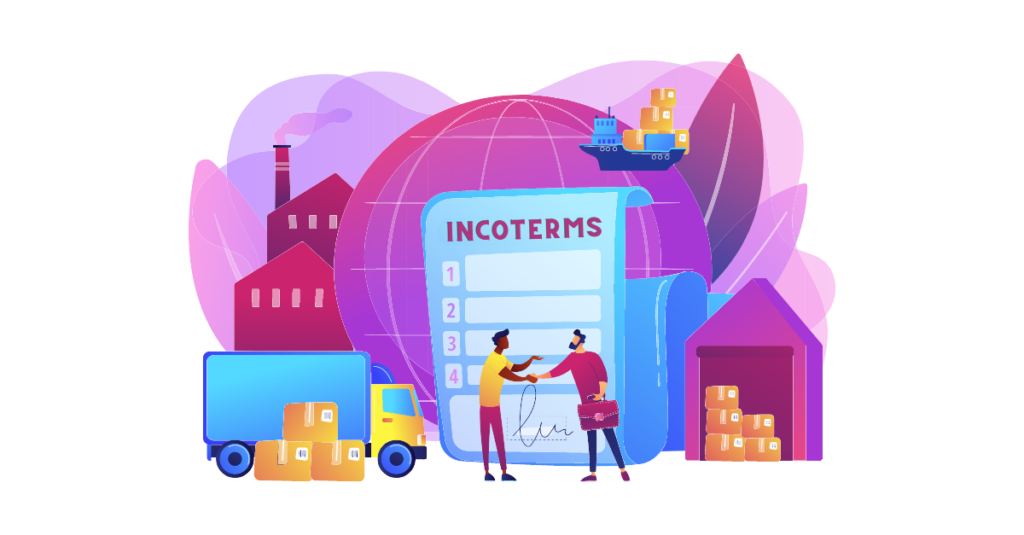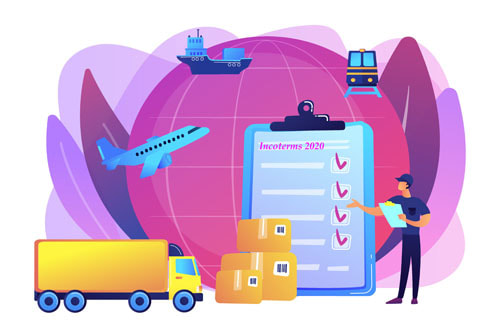- Home
- Company
- Services
- Blogs
- Gallery
- Useful Links
- Account
- Contact Us
- Get A Quote
Incoterm
What are Incoterms® rules?
Incoterms® rules are fundamental terms of trade globally recognized for the sale of goods. Whether you're placing a purchase order, preparing shipments for freight transport, or arranging certificates of origin, these rules offer clear guidance. They're essential for individuals involved in the daily import and export operations of global trade.
Who publishes the Incoterms® rules?
Since its establishment in 1919, the International Chamber of Commerce (ICC) has been dedicated to facilitating international trade. In response to varying practices and legal interpretations among traders worldwide, ICC published the first Incoterms® rules in 1936. These rules have been continuously updated and refined over the years. As ICC celebrated its centenary in 2019, it proudly announced the publication of Incoterms® 2020, designed to guide businesses into the next century of global trade.


Why use Incoterms® rules in international trade?
While other trade clauses exist globally, such as the Harmonised Tariff Schedule of the United States, Incoterms® rules offer a universal reach. Unlike national trade policies, Incoterms® rules provide clarity and predictability, serving as a common framework for international transactions.
What does “Incoterms®” stand for?
"Incoterms®" stands for international commercial terms and is a trademark of the International Chamber of Commerce. These rules feature abbreviations like FOB (“Free on Board”), DAP (“Delivered at Place”), EXW (“Ex Works”), and CIP (“Carriage and Insurance Paid To”), each carrying specific meanings for the sale of goods worldwide.
INCOTERMS 2020
EXW – EX WORKS (NAMED PLACE)
Under EXW, the recipient assumes responsibility for collecting goods from the supplier's premises, such as a store or warehouse. The supplier is only obligated to prepare the goods for shipment, with all costs borne by the recipient. This term is typically used for domestic transportation by any means.
FCA - FREE CARRIER (NAMED PLACE OF ORIGIN)
FCA is a widely used term, allowing flexibility in transport mode and delivery location within the seller's country. It involves two dispatch points, one owned by the seller and another not owned by them. The delivery is considered complete upon loading onto the buyer's vehicle or transfer to the buyer's designated courier.
FAS – FREE ALONGSIDE SHIP
FAS entails delivery completion when goods are placed alongside the ship for loading, to be handled by the recipient. It's specifically for sea or inland waterway transport, with the supplier covering export duties, packaging, and transportation to the port, while the recipient handles shipping, insurance, and import duties.
FOB - FREE ON BOARD (NAMED PORT OF LOADING)
Under FOB, delivery is fulfilled when goods are loaded onto the recipient's hired ship at the named port of loading. Responsibilities are shared equally between the supplier and recipient, covering export duties, packaging, and loading by the supplier, and shipping, insurance, and import duties by the recipient.
CFR/C&F - COST AND FREIGHT (NAMED PORT OF DESTINATION)
CFR involves delivery completion when goods are on board the supplier's hired ship at the destination port. Supplier responsibilities include export duties, packaging, transportation to the port, loading, and ship hiring, while the recipient manages unloading, delivery, insurance, and import duties.
CIF - COST, INSURANCE AND FREIGHT (NAMED PORT OF DESTINATION)
CIF entails delivery completion when goods are on board the supplier's hired vessel, insured and destined for the agreed port. Supplier obligations include export duties, packaging, transportation, loading, ship hiring, insurance, and documentation, with the recipient handling unloading, delivery, and import duties.
CIP - CARRIAGE AND INSURANCE PAID TO (NAMED PLACE OF DESTINATION)
CIP involves delivery completion after customs procedures, insurance, and transfer to the forwarder for transport to the specified destination. Supplier responsibilities encompass delivery, insurance, and documentation, with risks transferring to the recipient upon forwarding.
CPT - CARRIAGE PAID TO (NAMED PLACE OF DESTINATION)
CPT concludes delivery upon customs clearance and transfer to the forwarder for transport to the specified destination. Supplier responsibilities cover delivery and clearance, with risks shifting to the recipient upon forwarding. Unlike CIF and CIP, the recipient insures the goods.
DAP — DELIVERED AT PLACE
DAP signifies delivery completion upon goods' arrival at the specified destination, ready for unloading. Supplier obligations include export duties, transportation, loading, and delivery to the destination, with the recipient managing unloading, insurance, and import duties.
DPU — DELIVERED NAMED PLACE UNLOADED
DPU concludes delivery when goods are placed at the recipient's disposal at the named place, with the supplier bearing costs for export duties, delivery, and unloading. The recipient manages insurance, import duties, and other relevant expenses.
DDP — DELIVERED DUTY PAID
DDP signifies delivery completion upon goods' arrival at the destination, with all duties paid. The supplier assumes maximum obligations, covering export and import payments, transportation costs, and insurance. The recipient is responsible for unloading and optional insurance.
